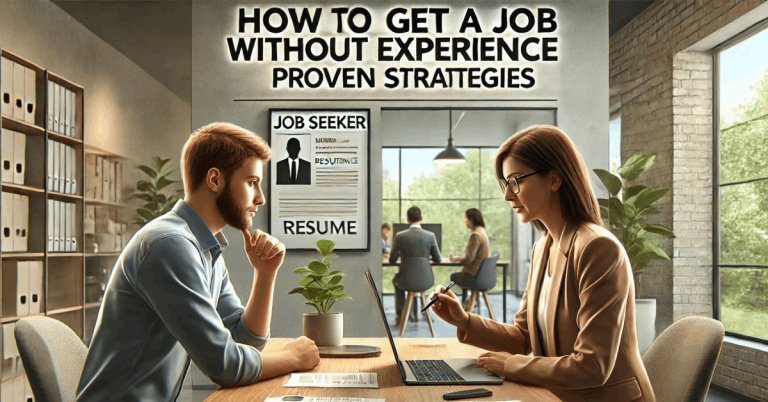Job interview tips can distinguish between landing a job or missing out. This article provides practical strategies to help you stand out and leave a lasting impression.
You’ll learn to prepare, communicate effectively, and showcase your strengths. Mastering these skills will increase your chances of securing the job you want.
Why Preparation Matters?
Being well-prepared helps you feel confident and in control. Employers notice when you come ready with knowledge and thoughtful answers.
Strong preparation reduces stress and improves how you present yourself. It also helps you avoid common mistakes that can cost you the job.
Knowing what to expect makes responding to questions easier. A well-prepared candidate always stands out.
Research the Company
Understanding the company shows your interest and professionalism. It helps you tailor your answers to fit the company’s needs.
Why Company Research Is Important
Employers expect candidates to know their mission and values. A strong understanding of the company culture helps you decide if it’s a good fit.
Industry knowledge shows you are engaged and aware of trends. Researching the company helps you anticipate possible questions.
It also allows you to align your skills with their business goals. Being informed makes you more credible in the employer’s eyes.
Where to Find Useful Information?
Learning about a company requires looking at the right sources. These key resources provide reliable insights:
- Company Website – Check the “About Us” page, recent blog posts, and leadership bios.
- Social Media – Follow their LinkedIn, Twitter, and Instagram for updates and cultural insights.
- Press Releases – Look for company news, financial reports, and upcoming projects.
- Employee Reviews – Read feedback on platforms like Glassdoor to understand workplace culture.
- Industry News – Check relevant business sites to see where the company stands in its field.
Understand the Job Description
A job posting tells you exactly what an employer wants in a candidate. Reading it carefully helps you tailor your responses to match their expectations.
How to Break Down a Job Posting?
A job description lists skills, qualifications, and responsibilities for the role. Pay attention to repeated words—they highlight the most important requirements.
Identify both hard skills (technical abilities) and soft skills (communication, leadership). Look for hidden expectations, such as the need for flexibility or teamwork.
Matching your experience to their needs makes your application stronger. Understanding the job details helps you explain why you’re the right fit.
Identifying Key Skills and Experience
Employers look for both technical and personal skills in candidates. Hard skills include software knowledge, industry expertise, and certifications.
Soft skills involve leadership, teamwork, and problem-solving abilities. Work history should highlight relevant experiences that prove these skills.
If you lack a skill, focus on your ability to learn quickly. Showing a balance of both skill types makes you a stronger candidate.
Practice Common Interview Questions
Being ready for common questions helps you respond with clarity and confidence. Practicing in advance reduces stress and improves your delivery.
Frequently Asked Questions
Employers often ask similar questions to assess your skills and experience. Preparing answers for these can help you feel more confident:
- Tell me about yourself.
- Why do you want this job?
- What are your strengths and weaknesses?
- Can you describe a time you handled a challenge?
- Where do you see yourself in five years?
- Why should we hire you?
- What do you know about our company?
- How do you handle pressure and deadlines?
- Describe a successful project you worked on.
- Do you have any questions for us?
Tips for Answering Questions Effectively
A strong response should be clear and to the point. Use these strategies to improve your answers:
- Use the STAR method – Structure answers with Situation, Task, Action, and Result.
- Keep it relevant – Focus on experiences that match the job.
- Be honest but strategic – Acknowledge weaknesses while showing how you improve.
- Avoid rambling – Stick to the key points and stay concise.
- Show enthusiasm – Let your interest in the role be clear.
- Practice out loud – Speaking your answers helps with delivery.
Make a Strong First Impression
The first few seconds matter. A professional and confident appearance can set a positive tone.
Why Being on Time Matters?
Punctuality shows respect for the employer’s time. Arriving early allows time to settle in and review your notes.
Rushing at the last minute can make you feel flustered. Being late signals poor time management and a lack of preparation.
Aim to be there 10-15 minutes early to stay relaxed. Timeliness reflects your reliability and work ethic.
Choosing the Right Attire
Dressing appropriately creates a positive first impression. Research the company culture to match the expected style.
A clean, well-fitted outfit looks more professional than expensive clothing. Avoid overly casual attire unless the workplace is informal.
Shoes should be polished and accessories kept simple. A neat appearance makes you look more competent.
Using Body Language to Show Confidence
Nonverbal cues influence how people perceive you. Good posture shows confidence and readiness.
A firm handshake (if appropriate) conveys self-assurance. Maintain eye contact to build trust and engagement.
Avoid crossing arms, which can seem defensive. A relaxed but upright stance helps you appear approachable.
Develop a Connection with the Interviewer
Building rapport makes the conversation more natural and engaging. A personal connection can make you more memorable.
How to Show Interest and Listen Actively?
Active listening proves you are engaged in the conversation. Use these techniques to stay present and responsive:
- Maintain eye contact – It signals attentiveness.
- Nod occasionally – Shows you are following along.
- Repeat key points – Reinforce understanding.
- Ask follow-up questions – Demonstrates genuine interest.
- Avoid interrupting – Let the interviewer finish speaking.
- Use the interviewer’s name – Adds a personal touch.
Finding Common Ground to Build Rapport
A shared connection makes the conversation more comfortable. Look for common interests based on the company, industry, or career path.
Mention any mutual experiences or values that align. If appropriate, discuss shared hobbies or professional networks.
Keep it natural and avoid forced small talk. A strong connection leaves a lasting impression.
Highlight Your Achievements
Employers want to see real results from your past experiences. Use specific examples to show how your skills made a difference.
Keep your answers focused on measurable outcomes like increased sales or improved efficiency. Clear and direct responses make your achievements stand out.
Ask Insightful Questions
Asking strong questions shows you are engaged and thinking ahead. Focus on topics like company culture, growth opportunities, or team dynamics.
Avoid questions that could be answered with a quick search online. Well-prepared questions leave a positive impression on the employer.
Follow Up
A follow-up message reinforces your interest and professionalism. Thank the employer for their time and briefly mention a key point from the discussion.
Keep it polite, concise, and appreciative without repeating too much. A well-crafted message helps you stay memorable after the conversation.
Closing Remarks on Making a Strong Impression
Preparation and confidence help you impress any employer. Researching, practicing responses, and engaging with the interviewer create a positive impact.
Small details, like punctuality and strong body language, also make a big difference. Mastering these essentials improves your chances of getting the job you want.












